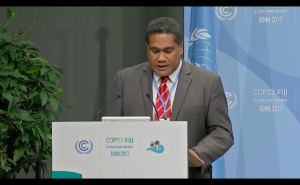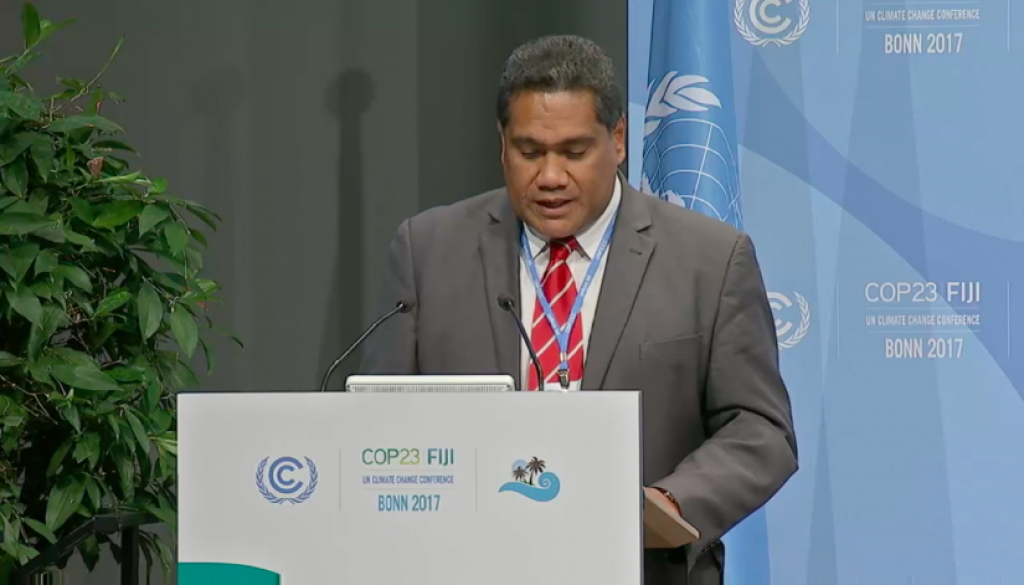Tonga Calls for Climate Action at COP23

20th November, 2017 It is undeniable that the effects of Climate Change increasingly threaten the very existence of Small Island Developing States such as Tonga, whose vulnerabilities are rapidly increasing and swiftly eroding our capacities for resilience, Tonga’s Head of Delegation at the COP23 told the High-Level Plenary meeting here on Thursday.
Mr Paula Pouvalu Ma’u, the Chief Executive Officer for Ministry of Meteorology, Energy, Information, Disaster Management, Environment, Climate Change, and Communications, of the Government of the Kingdom of Tonga presented Tonga’s statement at the United Nations Framework Convention on Climate Change 23rd Conference of the Parties, also serving as the 13th Session of the Meeting of the Parties to the Kyoto Protocol, and the 2nd Session of the Meeting of the Parties to the Paris Agreement.
He said capacities need to be strengthened, and enhanced, which would catalyze the required efforts for achieving and safeguarding our sustainable development aspirations.
“Such development efforts which continue to be hampered by unprecedented rates of coastal erosion, increasing occurrences of flash flooding, effects which are further compounded by tropical cyclones that are predicted to increase in intensity. Predictions as such, are the realities we currently endure,” Mr Ma’u said.
“A disturbing co-existence that in the long term will see our demises a small island nation-state, and ultimately results in our disappearance as a people and a culture. A despondent fate that will be sealed through low ambitions, weak action and inaction at worst.”
Mr Ma’u said the co-existence will ultimately lead to an undermining our national sovereignty, our national autonomy, our national security, and is cause in calling on the establishment of climate change as a core security issue.
He called on the United Nations Secretary-General to appoint a Special Representative on Climate Change and Security, and to have Climate Change and Security as a permanent agenda item for the UN Security Council.
Mr Ma’u told the meeting that the implementation of the Paris Agreement brings new hope.
“A hope that rest on the conscience of the global citizens. The early entry into force just prior to COP22 in Morocco signalled the next steps for a global partnership in the battle against the effects of climate change, a partnership to now be steered and guided by the Government of Fiji and in unison with the global community.”
Mr Ma’u said that Tonga and other Small Island Developing State success or failure hinges on the need to rapidly build resilience, and the urgent need for support to address adaptation as well as loss and damage.
He said this can be effectively achieved through the simplification of modalities for accessing international climate financing mechanism, and the establishment of a fast-track mechanism for resilience building and development in SIDS.
Mr Ma’u said Tonga recognizes and re-emphasizes the intrinsic value and imperative for limiting temperature increase to 1.50C.
“A goal that can only be achieved through genuine global cooperation in the implementation of the Paris Agreement, the Sendai Framework, Sustainable Development Goals, and the SAMOA Pathway,” he added.
He said Tonga has a streamlined approach which is strategically reflected, framed, and aligned to all elements contained in Tonga’s National Climate Change Policy 2016, in the development of the Kingdom’s pending JNAP Phase II, and the National Organizational Outcomes in the Strategic Development Framework 2015-2025, and the Nationally Determined Contribution.
Mr Ma’u said upon ratifying the Paris Agreement, Tonga is committed in ensuring rapid progression at the national level that will empower and enable efforts to implement the necessary actions toward achieving the country’s NDC targets.
The NDC targets have prompted Tonga to embark on an ambitious energy road map that will see a dramatic rise in the proportion of renewable energy in its energy supply through 50% access to renewable energy by 2020 and 70% by 2030, and the commitment to double the number of Marine Protected Areas by 2030.
“The of Kingdom of Tonga extends these same values and imperatives towards strengthening dialogue and partnerships for the enhancement of actions, support and synergies in the areas of technology, capacity building and the requisite financing for implementation,” he said.
“Financing that is channelled through numerous initiatives such as the Green Climate Fund, that can be further enhanced through a strengthened presence in the Pacific region. We welcome the simplified approval process for the Green Climate Fund.”
He said there is genuine partnerships and collective responsibility fostered between our countries, which must contain a robust element of transparency.
And he called on civil society, the academia, and the private sector to play their roles in ensuring genuine accountability by state actors, which must be steadfast and continue to be the solid drivers in our search for solutions to the adverse effects of Climate Change.
“As one of fourteen Pacific frontline countries affected by climate change, I look forward to more hard work ahead and the promise of a truly shared and sustainable global vision and investment for both Tonga and the world’s present and future generations,” Mr Ma’u added.
The COP23 will end today, with a communiqué on what has been decided to be released here in Bonn later today.
ENDS
Issued by the: Ministry of Meteorology, Energy, Information, Disaster Management, Environment, Climate Change and Communications.

